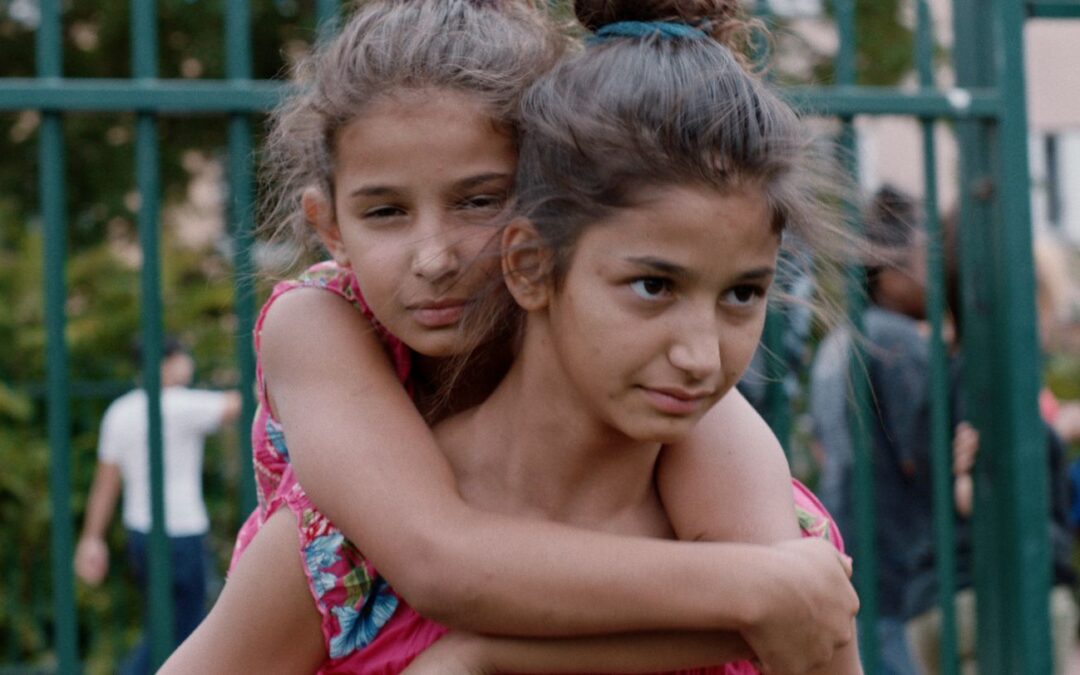(IMAGE: The Othrs)
Willa Productions, 2021. 91 minutes. Drama-documentary hybrid
Grade: 2.5 out of 4
Depending how much you know about the movie before going in, You Resemble Me can potentially create very different viewing experiences. For my part, I knew only that it was a film executive produced by Spike Lee, Spike Jonze, Riz Ahmed, and Abigail Disney, among others, about two real-life sisters who used to be close until one underwent a dramatic change. Knowing only that, and correlating it with the title, my suspicion was (a) it would be a documentary and (b) the drastic change would probably be coming out as trans. Neither of these suppositions proved true.
As the movie begins, with two young Arabic-French girls analyzing the violence in the lyrics of the French national anthem over a historical montage, the movie it most resembles is the unfairly judged Cuties, in which a Muslim girl in France must deal with cultural peer pressure from both the conservative and libertine sides of the culture-blend she knows. Here, young Mariam (Ilonna Grimaudo) and Hasna (Lorenza Grimaudo) walk the streets of Paris in mostly carefree fashion, wearing matching shoplifted dresses, and noting instances of cross-cultural violence around them. When their mother, who makes Mo’Nique in Precious look like Mitzi Fabelman, forgets Mariam’s birthday, confiscates her (also shoplifted) presents to re-sell, justifies it by telling her daughter just how much she bled giving birth, then starts beating Hasna, the two run away.
They handle themselves on the streets fairly well, for a short time. But when they’re caught comes the kicker – this isn’t the first time. Or the second. It’s a pattern, and France’s version of CPS will now split them up, sending Hasna to a Christian family who promptly serve her pork for Christmas.
Time passes, and Hasna grows up to be a street-savvy hooker. But she wants to go legit, and can’t, because only the most menial jobs will hire her…and even then, only until her more illegitimate “customers” show up to make trouble. Even the military turns her away. But when her cousin Hamid (Alexandre Gomin) appears on the news as one of the world’s most dangerous terrorists, a potential new pathway opens up.
Here’s where French audiences may have the advantage: they will have sussed by this point that we’re watching a biopic of Hasna Aït Boulahcen, the woman originally misclassified by the media as the first French female suicide bomber. The story soon unraveled, revealing that her bodily explosion was in fact involuntary, but media stateside barely talk(ed) about her. Going in knowing any part of the story lends it a horrific inevitability; going in unspoiled, however, made me wish the movie played out more differently than numerous similar movies about radicalization.
Director Dina Amer, who originally reported on Hasna’ story for Vice News, uses a narrative device that’s likely to go under-appreciated, casting three different actresses (Mouna Soualem, Sabrina Ouazani, and Amer herself) as the adult Hasna, along with the use of deepfake technology. It’s a device that doesn’t work as well for viewers unfamiliar with any of the actresses – what with all the religious headdresses and veils that constantly change Hasna’s image anyway, it’s harder to notice her literal face changing as well, without attributing it simply to different makeup and hair.
Cinematographer Omar Mullick wonderfully captures the energies of young Hasna. During the child sequences, he gives the camera a childlike point of view, darting around, taking in larger scenes, and seemingly by accident capturing larger cultural touchstones like a vandalized Marine le Pen poster. During her drugs-and-hooking phase, he gives it a drunken disorientation in the underlit and metaphorical darkness. Only towards the end, where he’s obliged tor recreate news footage without embellishment, does he feel hamstrung.
And so, indeed, does the rest of the movie. Amer researched the story heavily and wanted to stick to a just-the-facts approach – with the three actresses representing different contemporaneous newspaper images that misidentified other people as Hasna. Her movie, however, flourishes most when it’s not hamstrung by the official record, and tries to get into the head of what a younger girl and woman might experience and perceive en route to becoming a militant.
As straight reenactment, it misses the opportunity to set up cousin Hamid earlier. If she knew him as a child, let’s see that! It would make their reunion all the more resonant, and perhaps better seed his journey into abusiveness. Hasna makes a comment mid-movie about how her mother thought beating her would teach her to be obedient, but instead taught her to “morph into someone else in order to survive.” This fits with the device of casting three actresses, but again, that goes underappreciated if audiences aren’t familiar with any of them, and their differences could just as easily be approximated by makeup and shifts in performance.
For the benefit of anyone who didn’t know the story was true, the movie brings some of the real survivors on camera, which only serves to highlight the dichotomy of approaches. Having already reported the story as new, Amer rejected the idea of a documentary. She was right to do so – the parts that most closely resemble reenactment are the film’s weakest. But much like Hasna’s own personal journey, the movie itself feels like an artistic, vibrant spirit gradually compressed and strangled into the events it must fit.
Maybe that’s the idea.

